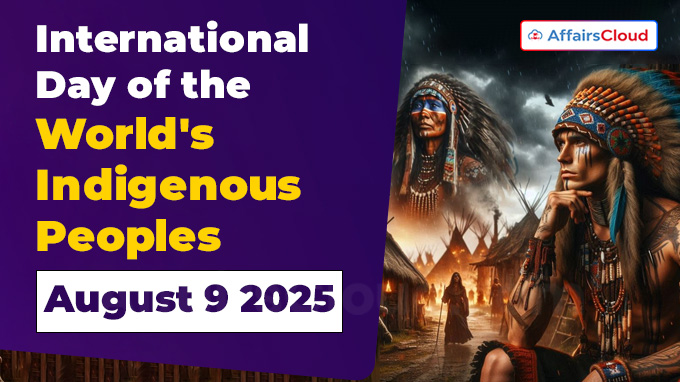
The United Nations (UN’s) International Day of the World’s Indigenous People (IDWIP), also known as World Tribal Day, is annually observed across the globe on 9th August to raise awareness and promote the rights, cultures, and identities of Indigenous communities while highlighting the unique challenges they face.
Exam Hints:
- Event: International Day of the World’s Indigenous Peoples (IDWIP) 2025
- Observed on: 9th August 2025
- 1st Observance: on 9th August 1995
- Theme: Indigenous Peoples and Artificial Intelligence (AI): Defending Rights, Shaping Futures
- Why? To commemorate 1st meeting of the UN-WGIP.
- Awards: 16th Equator Prize 2025 – 10 winners
- Indian Awardee – Bibifathima Self Help Group – India
Theme: The theme of IDWIP 2025 is “Indigenous Peoples and Artificial Intelligence (AI): Defending Rights, Shaping Futures”, focused on how AI impacts Indigenous communities and emphasized the importance of including them in AI development to safeguard their rights, knowledge, and culture.
Background Overview:
UN Declaration – 1st Decade: In December 1994, the United Nations General Assembly (UNGA) adopted Resolution A/RES/49/214, declaring 9th August of each year during the International Decade of the World’s Indigenous People (1995–2004) as the IDWIP.
UN Declaration – 2nd Decade: On 22nd December 2004, the UNGA adopted Resolution A/RES/59/174, proclaiming a second International Decade of the World’s Indigenous People from 1st January 2005 to December 2014.
First Observance: The first-ever International Day of the World’s Indigenous Peoples was observed on 9th August 1995.
Significance of 9th August: The date 9th August commemorates the first meeting of the United Nations (UN) Working Group on Indigenous Populations (WGIP), which was held in 1982 in Geneva, Switzerland, under the Sub-Commission on the Promotion and Protection of Human Rights.
UN Initiatives:
Languages Year (2019): In 1999, the UN declared 2019 as the International Year of Indigenous Languages (IY2019) to promote awareness of Indigenous languages and their role in preserving cultural diversity.
Languages Decade (2022-2032): In 2019, the UNGA adopted Resolution A/RES/74/135, declaring the period from 2022 to 2032 as the International Decade of Indigenous Languages (IDIL 2022–2032).
2025 Event:
On 9th August 2025, the United Nations Department of Economic and Social Affairs (DESA) hosted a virtual event to commemorate the IDWIP under the theme “Indigenous Peoples and AI: Defending Rights, Shaping Futures.”
16th Equator Prize:
Global Recognition: On the occasion of the IDWIP 2025, the United Nations Development Programme (UNDP), through its Equator Initiative, announced 10 winners of the 16th Equator Prize 2025.
- Equator Prize often called the “Biodiversity Nobel” awarded by the United Nations Development Programme UNDP
Award Purpose: The Equator Prize is awarded annually to honour community-led, nature-based solutions that support sustainable development and promote ecological resilience.
2025 Theme: The theme of Equator Prize 2025 is “Nature for Climate Action”, with a special emphasis on youth- and women-led climate initiatives addressing climate change through ecosystem restoration and inclusive green economies.
Award Highlights: Selected from 700+ nominations across 103 countries, the 2025 Equator Prize winners reflect the global leadership of Indigenous and local communities in climate action;
- Each of the 10 winners will receive USD 10,000 and be honoured virtually, expanding the Equator Prize network to 300+ initiatives from 84 countries since 2002.
Equator Prize 2025 Winners:
- Cooperativa de MujeresArtesanas del Gran Chaco (COMAR) – Argentina
- AssociaçãoUasei dos PovosIndígenas de Oiapoque – Brazil
- Hakhu Amazon Foundation – Ecuador
- BibifathimaSwaSahaya Sangha (Bibifathima Self Help Group) – India
- Mitra BUMMA (YayasanMenoken Indonesia Sejahtera BumiSemesta) – Indonesia
- RanuWelum Foundation – Indonesia
- Nature and People As One (NaPO) – Kenya
- Sea Women of Melanesia Inc. (SWoM) – Papua New Guinea
- The First Agrobiodiversity Zone in Peru: Cuyocuyo Terraces, Puno – Peru
- Sustainable Ocean Alliance Tanzania (SOA TANZANIA) – Tanzania
About Bibifathima Swa Sahaya Sangha:
Bibifathima is a women-led Self Help Group, founded in 2014 in niralagi haveri, Karnataka, that supports over 5,000 farmers in 30 villages through millet-based farming, seed banks, solar-powered processing, combining traditional knowledge with green practices to enhance biodiversity, food security, and climate resilience while empowering women and youth.
Global Indigenous Population:
Population Size: There are approximately 476 million Indigenous Peoples living across more than 90 countries worldwide.
Poverty Disparity: Although they make up less than 6% of the global population, they represent 15% of the world’s extreme poor.
Linguistic Diversity: Indigenous communities speak nearly 40% of the world’s 7,000 languages, showcasing vast linguistic richness.
Cultural Representation: They embody over 5,000 distinct cultures, contributing significantly to the world’s cultural heritage.
About the United Nations Development Programme (UNDP):
Administrator– Achim Steiner
Headquarters- New York, the United States of America (USA)
Established – 1965




